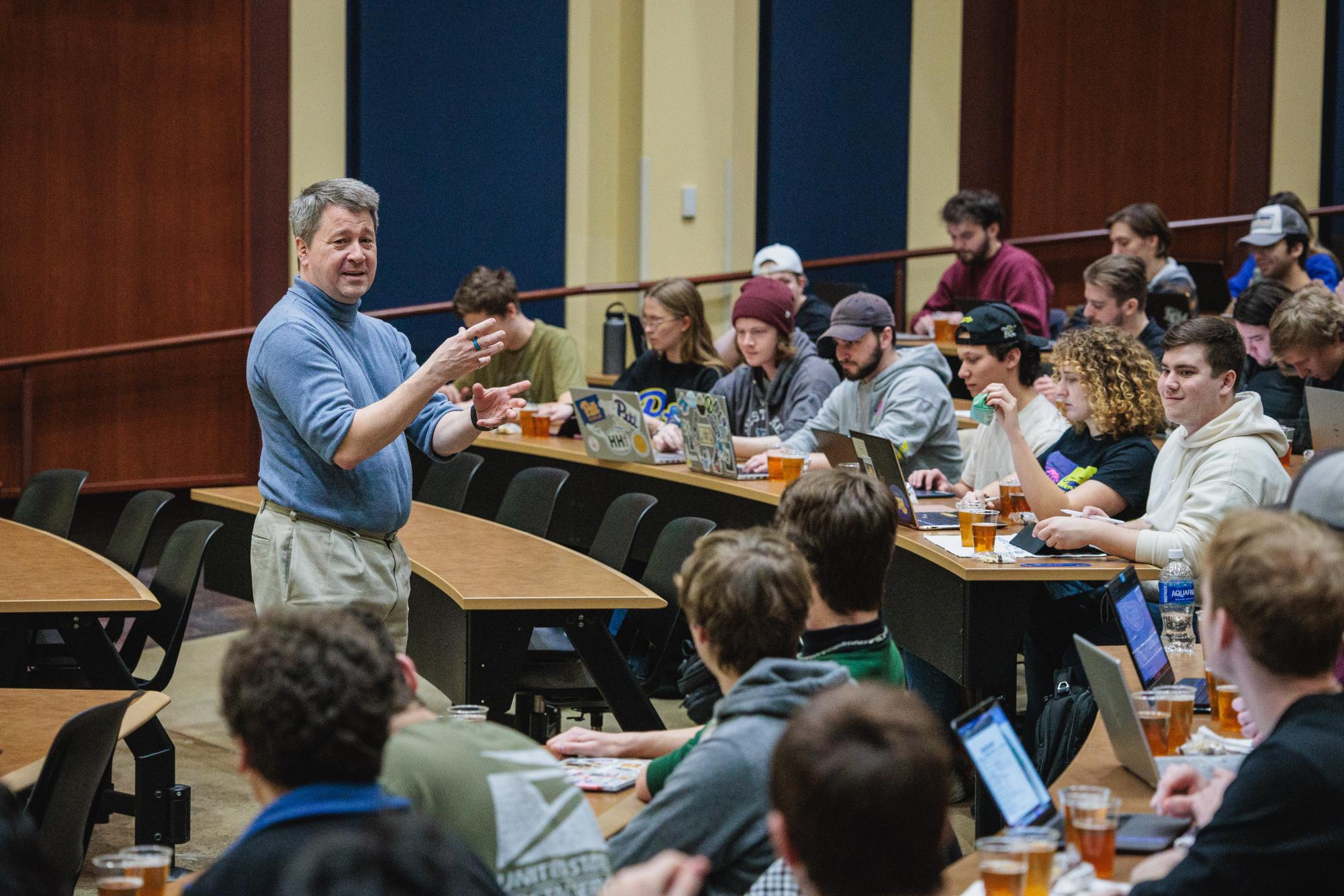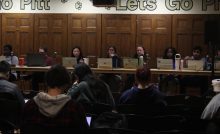Brewing course offers students opportunity to craft their own beer


Bob Parker speaks to students before they begin reviewing beers during a class Friday in David Lawrence Hall.
Robert Parker, a home beer brewer of 25 years and engineering professor at Pitt, decided he wanted to “do something different” and bring his “passion to work.”
Alongside his colleagues Rob Toplak and Dan Cole, Parker did just that by introducing the course Science, Technology, and Culture of Craft Brewing to the engineering department at Pitt.
“We sat down over lunch and a beer and designed what a syllabus might look like,” Parker said. “We’ve tried to scope it so that it is accessible for anyone who has a passion for learning something about beer.”
The class meets on Mondays and Wednesdays at 2:00 p.m. for lecture-based classes in the Cathedral of Learning. On Fridays, the class meets in Lawrence Hall for sensory beer tasting, which Parker said is the “international standard” for assessing beer quality.
“Judges will sit as a group around a table, they’ll have a sample that is in a [beer] style, but they don’t know what beer specifically it is,” Parker said. “There is a protocol by which they do this, and the students, for their sensory quizzes, have to follow the same protocol and score sheet.”
Lance Evans, a junior biochemistry major, said he finds the multidisciplinary crossover of this class “really cool.” Students of all majors can enroll in the course. Evans said each students’ individual area of study brings in a new “set of knowledge” and offers a special perspective on the task at hand.
“I’ve never had a class with some of these friends, because they’re from a wide spectrum of majors,” Evans said. “I’m a biochemistry major, but then I’m working in my group with a psychology major, there’s a business major and then there’s a lot of engineering majors naturally with the class. But it’s cool to see how everybody comes in with their set of knowledge.”
Students in this class get the chance to brew their own beer, which Evans is “really excited” for since he is “definitely a hands-on learner.” He said there’s a lot of enthusiasm among students about homebrewing.
“I think a lot of people want to try to buy some cheap equipment and try to brew themselves,” Evans said. “I think I would want to do it in the future because it’s just a fun thing to have in your garage, a nice hobby.”
Putting this class on the radar for majors outside of the STEM field is something that Parker continues to work toward. After Covid-19, he decided to “go big” and open the course up to the rest of campus so that anybody could take it, rather than just engineering students. Students with non-STEM backgrounds could offer perspectives on different aspects of the brewing process, including marketing or business.
“How would the marketing work, why would you put your brewery in this country? We’d like to tailor the project per group. But we just haven’t had the chance to really do that yet,” Parker said.
Parker said one way to expand the class’s horizons is by considering the ways it might satisfy approved electives for all majors. The course has physics, biology and chemistry all wrapped up in the yeast and brewing processes, according to Parker.
“I think at that point, I’ll have a broader pool of students who are both aware [that the course exists], and it’s blessed to satisfy something,” Parker said, “as opposed to being limited to students who [say], ‘I’ve got an extra three credits of space, I can take the brewing course.’”
Evans said he’s able to use his familiarity with some of the enzymes from biochemistry and reflect on previous courses to apply outside knowledge in his own way.
“It’s just really interesting to see the different ways to apply the science that I’m learning as a biochem major,” Evans said. “I took microbiology last semester. It’s cool to see that there’s this whole other side of microbiology where you’re extracting like these byproducts from yeast and it’s making this delicious drink.”
Jacob Suppes, a senior mechanical engineering major, is currently enrolled in this course and said he took the class because he likes beer and engineering.
“What you think of as far as drinking beer — which is a real and important aspect of the experience of learning about beer — is just enjoying it,” Suppes said. “But the science and technology is interesting, because it’s the reason I would want to go into engineering at all — the ability to dissect a problem and get a solution which meets certain criteria.”
This class, which leaves students with technical knowledge on the “typical processes” of beer, is more than that, according to Suppes. The course provides sensory experiences that leave students with real-world tasting knowledge, enough to become “your friend group’s beer nerd,” Parker said.
“A skill that I didn’t expect to be definitely gaining is the ability to taste, which I wouldn’t have thought as difficult before taking this class,” Suppes said. “But now, trying to actually do it, it’s not very easy, trying to differentiate between what actually makes something taste the way it does.”
In order to enroll in this course and participate in beer-tasting sensory days, Parker said students must be 21 by the day they register for the course. On sensory tasting sessions, which happen on Fridays, students have to show ID before they enter the room.
“We’re very careful … as long as they register either before the semester or during add/drop, they can join the class on the day they’re 21,” Parker said.
For these sensory sessions, Evans said students are given two “small cups of beer,” which amount to 16 ounces total. He said after tasting the beer independently and “writing down what you think,” the class opens up for discussion.
“That’s helpful too, because there are people in the class that know a lot about beer, and are much more knowledgeable than my friends and I,” Evans said. “So it’s good to hear their opinions as well, because they’re usually a little better, or in more accordance with what Dr. Parker says about the beer.”
This class gives students a well-rounded opportunity to not only learn about beer, but to refine their palette alongside these peers, according to Suppes.
“It’s very collaborative, because everybody has a different palette, but is kind of coming to a consensus on an overall, shared experience,” Suppes said. “It’s not just sitting at home, drinking a beer by yourself. You drink beer with other people.”
Recent Posts
SGB addresses concerns about ICE presence on campus, hears SJP lawsuit against administration, approves governing code bill
At its weekly meeting on Tuesday at Nordy’s Place, Student Government Board heard concerns about…
ACLU of Pennsylvania sues Pitt over SJP suspension
The ACLU of Pennsylvania filed a federal civil lawsuit against the University of Pittsburgh and…
Marquan Pope: The ultimate shark
One of the most remarkable things about sharks is that an injury doesn’t deter them.…
Who Asked? // Do we really get a summer vacation?
This installment of Who Asked? by staff writer Brynn Murawski mourns the seemingly impossible perfect…
Notes From an Average Girl // Notes from my junior year
In this edition of Notes From an Average Girl, senior staff writer Madeline Milchman reflects…
Meaning at the Movies // The Power of the Movie Theater
In this edition of “Meaning at the Movies,” staff writer Lauren Deaton discusses her love…

